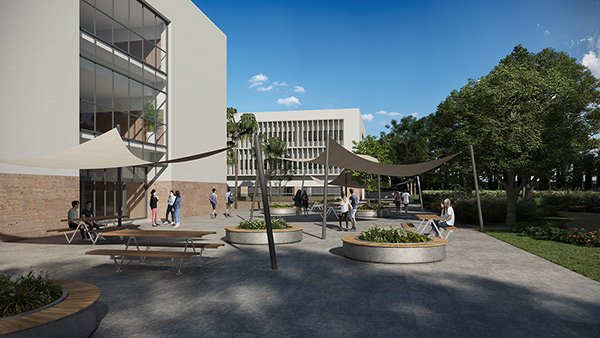The Bachelor's Degree in Computer Engineering offers a comprehensive practical education in the design, development and management of IT systems. With a focus on key areas such as programming, artificial intelligence, IT security and big data analytics, this degree prepares you to lead the future of digital technology. You’ll learn to solve real problems through projects and simulations in labs equipped with the latest technology, applying software development, network management and digital transformation techniques. From day one, you’ll work in collaborative environments, gaining the skills and knowledge you need to become an innovative, ethical and visionary professional in the current world of technology.
*University approved by law in the Andalusian Parliament on 24 July 2024, pending approval of its implementation for the academic year 25/26. Degree pending verification and implementation in the academic year 25/26 in accordance with current legislation.
| Campus-based | |
| Málaga | 4 years, 240 ECTS |
Start: 6 oct. 2025 | Polytechnic School |
Step into a transformative learning environment crafted to help you unlock your full potential and equip you with the tools you need to face the challenges of the future. Our innovative, hands-on approach to education immerses you in real-world learning, where you’ll collaborate with professionals from diverse fields. Here, you’ll gain not only expertise in your profession but also a holistic, future-ready perspective to make a lasting impact.



This degree will give you a solid grounding in key areas such as programming, computer networks and operating systems. You’ll also develop your skills in artificial intelligence, IT security and software development. During the early years, you'll gain a comprehensive understanding of the fundamentals of IT. As you progress, you'll be able to delve deeper into areas of interest to you, such as cybersecurity, mobile app development or data analysis, under the guidance of your professors. In the final year, you'll carry out intensive internships with companies in the industry and will prepare your Final Degree Project (TFG), to conclude your education with a holistic applied perspective.
Plan de estudios ofertado en el curso actual
First year
| Subject | Type | ECTS |
| Mathematical Analysis | Core | 6 |
| Fundamentals of IT | Core | 6 |
| Fundamentals of Programming | Core | 6 |
| Algebra | Core | 6 |
| Fundamentals of Computer Networks | Core | 6 |
| Discrete mathematics and logic | Core | 6 |
| Computer Structure | Core | 6 |
| Fundamentals of Physics for Engineering | Core | 6 |
| Engineering Project | Core | 6 |
| Object-oriented Programming | Compulsory | 6 |
Second year
| Subject | Type | ECTS |
| Databases | Compulsory | 6 |
| Programming with Linear Structures | Compulsory | 6 |
| Introduction to Software Engineering | Compulsory | 6 |
| Operating Systems | Compulsory | 6 |
| IT Project I | Compulsory | 6 |
| Concurrent and Distributed Programming | Compulsory | 6 |
| Web Development | Compulsory | 6 |
| Business | Core | 6 |
| Statistics | Core | 6 |
| IT Project II | Compulsory | 6 |
Third year
| Subject | Type | ECTS |
| Software Engineering | Compulsory | 6 |
| Algorithmic and nonlinear structures | Compulsory | 6 |
| Artificial Intelligence | Compulsory | 6 |
| User Interfaces | Compulsory | 6 |
| Computing Project I | Compulsory | 6 |
| Smart Systems and Knowledge Representation | Compulsory | 6 |
| Computer Networks | Compulsory | 6 |
| System Administration | Compulsory | 6 |
| Professional and Personal Efficiency | Compulsory | 6 |
| Computing Project II | Compulsory | 6 |
Fourth year
| Subject | Type | ECTS |
| Big Data | Compulsory | 6 |
| IT Security | Compulsory | 6 |
| Management Skills | Compulsory | 6 |
| Compilers and Formal Languages | Compulsory | 6 |
| Law and Standardisation | Compulsory | 6 |
| Elective 1 | Optional | 6 |
| Elective 2 | Optional | 6 |
| Internship | Internship | 6 |
| Final Degree Project (TFG) | TFG | 12 |
Elective Subjects
| Subject | Type | ECTS |
| University Activities | Optional | 6 |
| Internship Extension | Optional | 6 |
| Digital Transformation | Optional | 6 |
| Mobile App Development | Optional | 6 |
| Robotics | Optional | 6 |
Work internships are a key element in your training. Gaining experience beyond what you have learned in your degree is the best way to enter the labour market. There are two types of internships, curricular (included in your syllabus) and extracurricular (which you can do on a voluntary basis).
To do a curricular internship in a company, you will need to have passed 50% of the credits and enrol in the course before starting your internship. These internships are monitored by the company and the internship teacher, as well as the completion of interim and final reports for evaluation.
If you want to improve your work experience before finishing your university studies, you can do an extracurricular internship. You can do them in any course, but we remind you that internships are a training complement to your studies; therefore, the more knowledge you have acquired throughout your degree, the more you will benefit from the internship experience.
Start your future at Universidad Europea
You can become a student at Universidad Europea in three easy steps.
1
Start your admission process by calling +34 951102240 or request information and our advisors will contact you.
2
Once you have been admitted, secure your place by paying the reservation fee.
3
Submit the required documents to formalise your enrollment.
Scholarships and financial aid
We want to help you. If you want to study at the Universidad Europea, you will have at your disposal a wide selection of own and official scholarships.
Credit recognition and transfers
You don’t have to stick with something you don’t like. That’s why we’ve designed specific plans for credit recognition and transfers.
Request your online credit recognition review, transfer your academic file and start studying at Universidad Europea.
The ideal profile for the Bachelor's Degree in Computer Engineering includes people who have a clear appreciation for technology and innovation, and a deep interest in developing digital solutions and IT systems. These students stand out for their skills in logic and analysis, as well as for their ability to solve complex problems in an organised, efficient way. They also have a creative, adaptable mindset, which is essential to meet the challenges of a constantly evolving field. A strong willingness to learn continuously is also an asset, as IT requires keeping up to date with developments in technology and programming.
If you study the Degree in Computer Engineering at Universidad Europea, it’ll take four years. During the programme, you will get a deep understanding of many areas, such as:
As part of the degree, you can also obtain the CISCO and AWS certifications.
Yes, a computer engineering degree can be a good option for people interested in pursuing a career in technology. Computer engineering is a field that combines the principles of computer science and electrical engineering to design and develop computer systems and hardware.
Once they have completed their degree, graduates are highly sought after by a variety of industries, including software development, electronics manufacturing, telecommunications, and aerospace. The rapid growth and evolution of technology means that across the world there is a demand for skilled professionals in computer science.
Computer engineers are in high demand in many countries across the world because of the specific skills they offer. As we rely more and more on technology, companies and organisations of all sizes need professionals capable of designing and maintaining computer hardware and software systems.
On the Degree in Computer Engineering at Universidad Europea, you’ll not just learn the theory, but put into practice your knowledge via an academic model based on experiential learning, and completing internships and work placements, getting the skills needed ahead of launching your career in this growing sector.
The Degree in Computer Engineering at Universidad Europea involves aspects of computer science and electrical engineering. Computer engineering is a branch of engineering that focuses on the design, development, and maintenance of computer systems and their components.
The following is just an example of some of what you’ll study on the degree:
Overall, the degree in computer engineering provides a broad range of knowledge and skills that can be applied to a variety of industries, including software development, hardware design, telecommunications, and robotics.